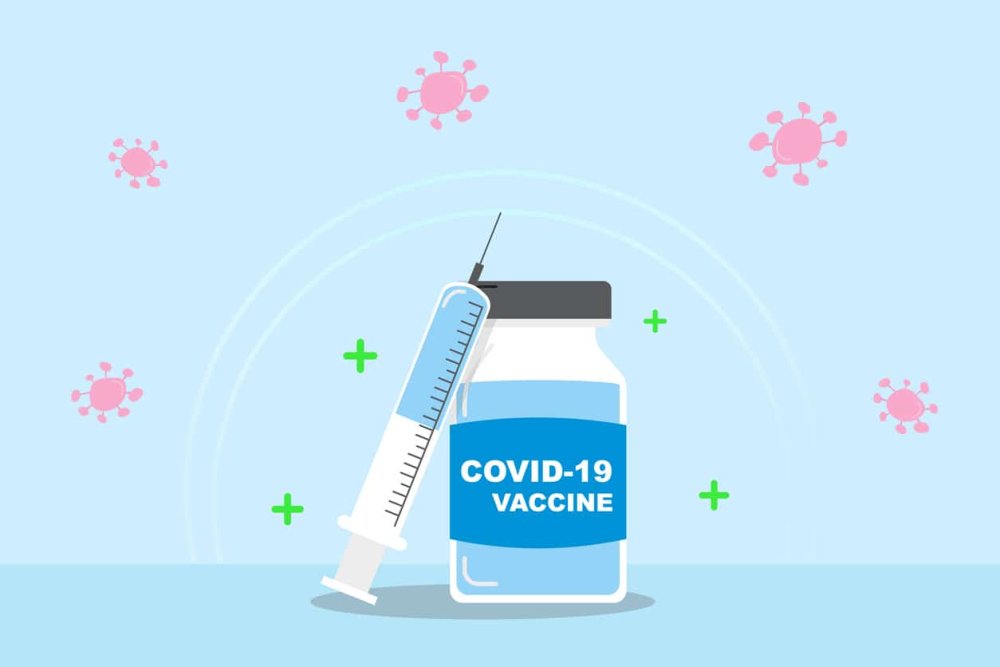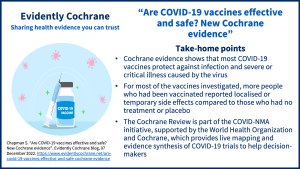In this blog, Sarah Chapman from Cochrane UK looks at the new evidence from Cochrane on COVID-19 vaccines.
Take-home points
It’s three years since COVID-19 was first reported. Since then, almost 80% of us in the UK (70% worldwide) have had at least one dose of a COVID-19 vaccine and just over 75% (65% worldwide) have been fully vaccinated. The rapid development of several effective vaccines against SARS-CoV-2 , a previously unknown virus, is surely a major success story. A new Cochrane ReviewCochrane Reviews are systematic reviews. In systematic reviews we search for and summarize studies that answer a specific research question (e.g. is paracetamol effective and safe for treating back pain?). The studies are identified, assessed, and summarized by using a systematic and predefined approach. They inform recommendations for healthcare and research. Efficacy and safety of COVID-19 vaccines (published December 2022) now brings together the best available evidence on the effectivenessThe ability of an intervention (for example a drug, surgery, or exercise) to produce a desired effect, such as reduce symptoms. and safetyRefers to serious adverse effects, such as those that threaten life, require or prolong hospitalization, result in permanent disability, or cause birth defects. of a number of these.
The Cochrane Review authors wanted to find out how well COVID-19 vaccines work in reducing the following: infection with the virus, disease with symptoms, severe disease, and the number of deaths from any cause. They also wanted to know about vaccine safety.
They looked for studies of randomizedRandomization is the process of randomly dividing into groups the people taking part in a trial. One group (the intervention group) will be given the intervention being tested (for example a drug, surgery, or exercise) and compared with a group which does not receive the intervention (the control group). controlled trialsA trial in which a group (the ‘intervention group’) is given a intervention being tested (for example a drug, surgery, or exercise) is compared with a group which does not receive the intervention (the ‘control group’). comparing COVID-19 vaccines with each other, with placeboAn intervention that appears to be the same as that which is being assessed but does not have the active component. For example, a placebo could be a tablet made of sugar, compared with a tablet containing a medicine. (a sham vaccine – it looks the same but has no active ingredient), or with no vaccine.
They were able to include 41 studies of over almost 434,000 people, assessing 12 vaccines, including full primary vaccination series and booster doses. Most studies compared a vaccine with placebo, only have short-term results (most only two months after full vaccination), and were done before ‘variants of concern’ appeared.
The evidence may not apply to everyone. Because they were excluded from taking part in the trialsClinical trials are research studies involving people who use healthcare services. They often compare a new or different treatment with the best treatment currently available. This is to test whether the new or different treatment is safe, effective and any better than what is currently used. No matter how promising a new treatment may appear during tests in a laboratory, it must go through clinical trials before its benefits and risks can really be known., it’s not possible to say that the results of the review apply to pregnant women, people with weakened immune systems or people who have had COVID-19 before.
What the evidence shows about how well COVID-19 vaccines work
Most vaccines reduce or probably reduce the riskA way of expressing the chance of an event taking place, expressed as the number of events divided by the total number of observations or people. It can be stated as ‘the chance of falling were one in four’ (1/4 = 25%). This measure is good no matter the incidence of events i.e. common or infrequent. of getting COVID-19, compared with placebo: Pfizer/BioNTech, Moderna, CureVac COVID-19, Oxford-AstraZeneca, Janssen, Sputnik V (Gam-COVID-Vac),Sinopharm (WIBP CorV and BBIBP-CorV), Bharat (Covaxin), Novavax and Soberana 2 (Finlay-FR-2).
These vaccines reduced or probably reduced the risk of severe or critical illness: Pfizer/BioNTech, Moderna, Janssen, Sputnik V, Bharat and Novavax.
The evidence on deaths from any cause is uncertain for most vaccines, as very few deaths were reported during the trials.
What evidence is there about the safety of COVID-19?
There is evidence that, unsurprisingly, more people who had been vaccinated reported side effects than those who had been given a placebo or had no treatmentSomething done with the aim of improving health or relieving suffering. For example, medicines, surgery, psychological and physical therapies, diet and exercise changes.. These side effects included feeling sick, tiredness, headache, chills, fever and muscle pains. They are usually mild and don’t last long.
As for serious harms, the review authors conclude “there is probably little or no difference between most vaccines and placebo”.
What next for research on COVID-19 vaccines?
There is a lot that we still need to know, including the effectiveness and safety of the vaccines in different groups of people (like pregnant women) and against variants of concern; how new vaccines compare with existing ones and how to overcome the problem of vaccine effectiveness wearing off over time. We also need to know more about vaccine schedules, and about their effect on other outcomesOutcomes are measures of health (for example quality of life, pain, blood sugar levels) that can be used to assess the effectiveness and safety of a treatment or other intervention (for example a drug, surgery, or exercise). In research, the outcomes considered most important are ‘primary outcomes’ and those considered less important are ‘secondary outcomes’., such as preventing long COVID-19.
Keeping up with new evidence
There are many trials of COVID-19 vaccines happening (more than 600 randomised trials have been registered) and the evidence base is changing rapidly. This review is part of a bigger project, the COVID-NMA initiative. Results are made available and updated on their website every two weeks, providing decision-makers with an up-to-date mapping and synthesis of evidence on this and other interventions for preventing and treating COVID-19.
This review will be updated at least twice a year, or sooner if new evidence changes the conclusions or the certainty of the evidenceThe certainty (or quality) of evidence is the extent to which we can be confident that what the research tells us about a particular treatment effect is likely to be accurate. Concerns about factors such as bias can reduce the certainty of the evidence. Evidence may be of high certainty; moderate certainty; low certainty or very-low certainty. Cochrane has adopted the GRADE approach (Grading of Recommendations Assessment, Development and Evaluation) for assessing certainty (or quality) of evidence. Find out more here: https://training.cochrane.org/grade-approach.
Find out more
NHS pages on Coronavirus (COVID-19) vaccine https://www.nhs.uk/conditions/coronavirus-covid-19/coronavirus-vaccination/coronavirus-vaccine/
Evidently Cochrane blogs on COVID-19 evidence can be found here and include blogs on COVID tests: how accurate are LFTs? Treatments for mild COVID-19; Treatments for moderate to severe COVID-19; and COVID-19 evidence: a Cochrane round-up.
The Cochrane Review:
Plain Language Summary – What are the benefit and risks of vaccines for preventing COVID-19?
Full review – Graña C, Ghosn L, Evrenoglou T, Jarde A, Minozzi S, Bergman H, Buckley BS, Probyn K, Villanueva G, Henschke N, Bonnet H, Assi R, Menon S, Marti M, Devane D, Mallon P, Lelievre J-D, Askie LM, Kredo T, Ferrand G, Davidson M, Riveros C, Tovey D, Meerpohl JJ, Grasselli G, Rada G, Hróbjartsson A, Ravaud P, Chaimani A, Boutron I. Efficacy and safety of COVID-19 vaccines. Cochrane Database of Systematic ReviewsIn systematic reviews we search for and summarize studies that answer a specific research question (e.g. is paracetamol effective and safe for treating back pain?). The studies are identified, assessed, and summarized by using a systematic and predefined approach. They inform recommendations for healthcare and research. 2022, Issue 12. Art. No.: CD015477. DOI: 10.1002/14651858.CD015477.
Press release 07 December 2022 Cochrane Review of COVID-19 vaccines shows they are effective.
You can join in the conversation on Twitter with @SarahChapman30 @CochraneUK or leave a comment on the blog.
Please note, we cannot give specific medical advice and do not publish comments that link to individual pages requesting donations or to commercial sites, or appear to endorse commercial products. We welcome diverse views and encourage discussion but we ask that comments are respectful and reserve the right to not publish any we consider offensive. Cochrane UK does not fact check – or endorse – readers’ comments, including any treatments mentioned.
Sarah Chapman has nothing to disclose.




I used to think of the Cochrane as a Gold standard. But it’s becoming clear that they are losing their capability of reviewing the science in a manner that’s congruent with the scientific method. Are you morphing into another bought and paid for organisation?
Hi, thanks for your comment and expressing your concerns. We continue to be regarded as the Gold Standard in health evidence because of our rigorous methods, not accepting commercial or conflicted funding, and our strict Conflict of Interest policies.
We welcome comments on specific reviews, please see here https://www.cochranelibrary.com/cdsr/comments-submission For this review, you can submit your comment/concerns at https://www.cochranelibrary.com/cdsr/doi/10.1002/14651858.CD015477/comment so that it may go through the proper channels of review and inquiry.
As we share a high regard for scientific method, we also invite you to join Cochrane and participate in our work. https://www.cochrane.org/join-cochrane Together the Cochrane community is making a difference to make sure health decisions are based on trusted, high quality health evidence.
Sarah Chapman, Editor.
[…] they were getting a much milder case than they would have if they weren’t vaxxed. (See e.g., here but note link to W.H.O.) You can’t really argue that isn’t true, but therein lies the problem. […]